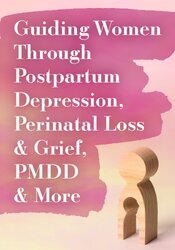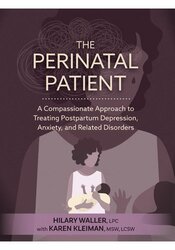Overcoming Patient Resistance During the Perinatal Period

The simultaneous longing for privacy and support from others is the perfect recipe for resistance from new mothers because they commonly fear that they will be viewed as incapable, lazy, or bad if they require help or guidance. However, the reality is that all moms need help. From learning a new baby’s preferred soothing style to learning how to juggle multiple children, there is so much new material to master during pregnancy and early parenthood—no matter how many children a mother has.
However, new parents notoriously resist asking for any kind of help for many, many reasons. Perhaps most painfully, they fear being viewed or treated as an unfit parent. They also worry that their internal monologue, already plagued by doubt and what-ifs, will be validated if they ask for help. They feel guilty for imposing their problems on others. They worry that they will not live up to expectations. For all these reasons and more, they avoid asking for help and even deny or refuse help that is offered, no matter how badly it is needed.
Given the fear and vulnerability that drives a mother’s resistance, it is crucial for providers to remain affirmative but gentle when assessing mothers for mental health issues during the perinatal period. If you are a provider, this free Resistance to Disclosure worksheet can help you in this effort. And if you have clients going through this, you can share this free Overcoming Resistance worksheet to help them recognize and overcome the reasons for their reluctance, increasing the possibility that they will receive the help they need to begin feeling better.
One extremely powerful way to combat resistance is to normalize the act of help-seeking during the perinatal period. If you interact with and provide care for perinatal mothers in any capacity, you should normalize all mothers’ need for support, whether or not something is actually wrong. You can do so by encouraging all new mothers to seek resources for their mental health and emotional well-being, just as you would encourage all expectant mothers to seek prenatal care.
In particular, you should convey to mothers that:
At the same time, you want to take care to send the correct message—normalizing the fact that new mothers can expect some degree of discomfort and overwhelm during the perinatal period, but not too much. You want to communicate is that there is a threshold for what is considered normal perinatal distress. Even the most vigilant parents can fail to recognize when they have reached this threshold and crossed the line from transient stress to symptoms of a perinatal mood and anxiety disorder. For this reason, you want to emphasize that they seek help from a trained professional who is skilled at recognizing these subtle symptoms. These providers can help parents explore their individual thresholds for distress and determine what level of support is needed.
As a reminder, these free worksheets and The Perinatal Patient: A Compassionate Approach to Treating Postpartum Depression, Anxiety, and Related Disorders do not serve as diagnostic tools, but they do aim to empower providers to help mothers in distress as well as empower mothers to talk to someone who can help them sort out what they are experiencing.
However, new parents notoriously resist asking for any kind of help for many, many reasons. Perhaps most painfully, they fear being viewed or treated as an unfit parent. They also worry that their internal monologue, already plagued by doubt and what-ifs, will be validated if they ask for help. They feel guilty for imposing their problems on others. They worry that they will not live up to expectations. For all these reasons and more, they avoid asking for help and even deny or refuse help that is offered, no matter how badly it is needed.
Given the fear and vulnerability that drives a mother’s resistance, it is crucial for providers to remain affirmative but gentle when assessing mothers for mental health issues during the perinatal period. If you are a provider, this free Resistance to Disclosure worksheet can help you in this effort. And if you have clients going through this, you can share this free Overcoming Resistance worksheet to help them recognize and overcome the reasons for their reluctance, increasing the possibility that they will receive the help they need to begin feeling better.
One extremely powerful way to combat resistance is to normalize the act of help-seeking during the perinatal period. If you interact with and provide care for perinatal mothers in any capacity, you should normalize all mothers’ need for support, whether or not something is actually wrong. You can do so by encouraging all new mothers to seek resources for their mental health and emotional well-being, just as you would encourage all expectant mothers to seek prenatal care.
In particular, you should convey to mothers that:
- Seeking help for emotional health in the perinatal period is as normal as seeking assessment for an infant’s breastfeeding latch. We recommend initiating conversations about mental health as routinely as you would initiate conversation about the baby’s name or the mother’s expected due date.
- There are many options for support and levels of care, depending on whether a mother is mildly stressed or experiencing symptoms of a full-blown mood disorder.
- The perinatal period extends far beyond the first few days or weeks postpartum, and help is available to them at any time during the first year postpartum (or beyond).
At the same time, you want to take care to send the correct message—normalizing the fact that new mothers can expect some degree of discomfort and overwhelm during the perinatal period, but not too much. You want to communicate is that there is a threshold for what is considered normal perinatal distress. Even the most vigilant parents can fail to recognize when they have reached this threshold and crossed the line from transient stress to symptoms of a perinatal mood and anxiety disorder. For this reason, you want to emphasize that they seek help from a trained professional who is skilled at recognizing these subtle symptoms. These providers can help parents explore their individual thresholds for distress and determine what level of support is needed.
As a reminder, these free worksheets and The Perinatal Patient: A Compassionate Approach to Treating Postpartum Depression, Anxiety, and Related Disorders do not serve as diagnostic tools, but they do aim to empower providers to help mothers in distress as well as empower mothers to talk to someone who can help them sort out what they are experiencing.
Online Course:
Guiding Women Through Postpartum Depression, Perinatal Loss & Grief, PMDD & More
Guiding Women Through Postpartum Depression, Perinatal Loss & Grief, PMDD & More

Get CBT, DBT, CPT & attachment-informed skills to treat miscarriage grief, perinatal loss, menstrual cycle emotional dysfunction & more. Treat co-occurring disorders, help clients process strong emotions and process your own emotions. PLUS, bonus articles on fertility. Up to 15.0 CE hours for both mental health & healthcare professionals!
The Perinatal Patient

Caught between worrying about how she feels and desperately working to portray the image of a good mother, a perfect mother, a mother who knows what she’s doing, the postpartum woman in distress is more likely to choose silence or minimization over disclosure.
She will allow her suffering – her dark mood, scary intrusive thoughts, intense anxiety, excessive monitoring of the baby, feelings of inadequacy, grief over lost independence, thoughts of harming herself or the baby, and even delusions and hallucinations – to fly under the radar in exchange for a calm and collected exterior. Even if she’s worried about how she feels. Even if she and her baby are in danger.
The Perinatal Patient seeks to change that. Co-written by world-renowned maternal mental health expert Karen Kleiman and her highly accomplished mentee at The Postpartum Stress Center, Hilary Waller, this book offers revolutionary, compassionate guidance into the nuanced assessment and treatment of mental health symptoms postpartum – a critical period that does not offer the luxury of time.
She will allow her suffering – her dark mood, scary intrusive thoughts, intense anxiety, excessive monitoring of the baby, feelings of inadequacy, grief over lost independence, thoughts of harming herself or the baby, and even delusions and hallucinations – to fly under the radar in exchange for a calm and collected exterior. Even if she’s worried about how she feels. Even if she and her baby are in danger.
The Perinatal Patient seeks to change that. Co-written by world-renowned maternal mental health expert Karen Kleiman and her highly accomplished mentee at The Postpartum Stress Center, Hilary Waller, this book offers revolutionary, compassionate guidance into the nuanced assessment and treatment of mental health symptoms postpartum – a critical period that does not offer the luxury of time.
Meet the Experts:
Hilary Waller, MS, LPC, is a psychotherapist who specializes in the treatment of perinatal mood and anxiety disorders. She is the director of education and programming at The Postpartum Stress Center outside of Philadelphia, which was founded by renowned perinatal expert Karen Kleiman and was listed in Philly Magazine as a “Center of Excellence” for maternal/fetal care in 2008. In addition to providing direct care services to individuals, couples, and groups at the center, Hilary serves as an instructor with Karen Kleiman, providing a quarterly 12 CE hour postgraduate advanced training for clinicians across the US and abroad who want to specialize in treating the perinatal population. She conducts workshops and trainings for maternal mental healthcare providers as well as non-clinical staff working with the perinatal population. Hilary completed her master’s degree in counseling psychology from Holy Family University in 2013. She is deeply honored to support new patients.
Learn more about her educational products, including upcoming live seminars, by clicking here.
Karen Kleiman, MSW, LCSW, is a well-known international maternal mental health expert with over thirty-five years of experience. As an advocate and author of several groundbreaking books on postpartum depression and anxiety, her work has been featured worldwide within the mental health community and beyond for decades. In 1988, Karen founded The Postpartum Stress Center, the premier treatment and training facility for prenatal and postpartum depression and anxiety. In 2022, she founded The Karen Kleiman Training Center, LLC, dedicated to the advancement of clinical expertise and therapeutic strategies for the treatment of perinatal mood and anxiety disorders. All advanced trainings are heavily influenced by The Art of Holding Perinatal Women in Distress™ model of intervention she developed in 2017.
Learn more about her educational products, including upcoming live seminars, by clicking here.
Learn more about her educational products, including upcoming live seminars, by clicking here.
Karen Kleiman, MSW, LCSW, is a well-known international maternal mental health expert with over thirty-five years of experience. As an advocate and author of several groundbreaking books on postpartum depression and anxiety, her work has been featured worldwide within the mental health community and beyond for decades. In 1988, Karen founded The Postpartum Stress Center, the premier treatment and training facility for prenatal and postpartum depression and anxiety. In 2022, she founded The Karen Kleiman Training Center, LLC, dedicated to the advancement of clinical expertise and therapeutic strategies for the treatment of perinatal mood and anxiety disorders. All advanced trainings are heavily influenced by The Art of Holding Perinatal Women in Distress™ model of intervention she developed in 2017.
Learn more about her educational products, including upcoming live seminars, by clicking here.






